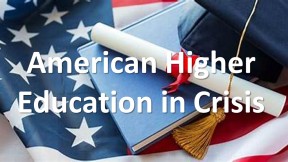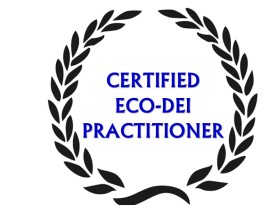Hubert Rampersad, Ph.D.
“American companies, colleges, and universities need to reconsider their corrupt DEI policies, ensuring they are fair, transparent, and effective. While it’s important to prioritize diversity, equity, and inclusion in leadership hiring processes, ensuring that the most qualified individuals are selected based on their expertise and capabilities is equally crucial. Simply hiring leaders in response to the Black Lives Matter and gender movement may not guarantee the desired outcomes and could potentially compromise the quality of higher education leadership. To address these concerns, leaders need to move beyond diversity, equity, inclusion, gender, and race theater and instead focus on implementing sustainable DEI initiatives. Rebuilding trust requires a reconnection with authenticity, humility, and integrity. By fostering empathy and promoting inner alignment, leaders can create an ethical and sustainable culture of ECO-DEI within American companies and education institutions. This shift in focus will ensure that DEI efforts are embedded in the core values and practices of American companies, colleges, and universities, benefiting all members of the community.” –-Hubert Rampersad
DEI at American universities and colleges does not actually promote inclusivity. It is the opposite of diversity of thought. Students are classified into groups based on their race and heritage. DEI is being used as a cover to justify discrimination. Jews are considered “oppressors” by the DEI system, so the discrimination they face is somehow justified by its believers. This kind of ideology at American universities and colleges needs to be eliminated. Survey Shows Minorities Support Death of DEI.
Bill Ackman, a billionaire and Harvard graduate, has voiced his concern regarding the hiring practices of American universities and colleges. He believes that candidates are being selected based on diversity, equity, and inclusion (DEI) policies, which can limit the pool of potential candidates by excluding those who do not meet certain criteria based on race or gender. According to a recent analysis by Inside Higher Ed, colleges and universities have hired a higher percentage of non-white leaders in the wake of the Black Lives Matter movement, read “Diversity on the Rise Among College Presidents”. This approach does not necessarily lead to the best leaders being chosen and may ultimately harm the quality of higher education in America. Read also “Redefining American Higher Education”.
Ackman’s comments come after he called for the resignation of three university presidents who failed to condemn anti-Semitic behavior on their campuses. Harvard’s presidential search committee, for example, only considers candidates who meet the DEI office’s criteria. Ackman believes that shrinking the pool of potential candidates based on race, gender, or sexual orientation is not the optimal approach to identifying the best leaders for our most prestigious universities. Read also “Until DEI offices are closed, don’t expect better college presidents“.
Simply hiring school leaders in response to above-mentioned movements could compromise the quality of higher education, read “Why Diversity, Equity, and Inclusion Suck”.

DEI at American colleges and universities are mainly focused on racial and gender justice and cozy initiatives. Their hiring process is not focused on recognizing the value of differences and similarities among people, promoting synergy between diverse talents and skills, and fostering a sense of belonging among all individuals.
ECO-DEI
Universities and colleges must cultivate sustainable cultures that promote talent development and foster a sense of involvement, acceptance, respect, and connection to thrive. These cultures should encourage ethical, harmonious, and respectful interactions among individuals, fostering a synergetic culture of trust, learning, open communication, and innovation, ultimately leading to the best results. It is essential to value diverse thinking from individuals with different backgrounds and perspectives. This new approach, known as ECO-DEI emphasizes the need for a holistic and long-term view of diversity, equity, inclusion, and belonging.
ECO-DEI Life Cycle Scan
To measure and fix diversity, equity, and inclusion at universities and colleges, institutions need to establish a comprehensive and effective system of metrics to track their progress. Institutions struggle to measure the effectiveness of their DEI initiatives. Managing DEI effectively becomes nearly impossible without proper measurement. Therefore, I present the unique ECO-DEI life cycle scan. The ECO-DEI life cycle scan serves as an assessment system universities and colleges can use to effectively manage and cultivate diversity in their workforce.
It outlines the fundamental characteristics required to create a work environment that values and promotes diverse perspectives while encouraging respectful interactions among individuals. The ultimate goal is to ensure that no individual is excluded based on their differences, thus enabling them to achieve their full potential. With this assessment system, universities and colleges can comprehensively and systematically measure their diversity, inclusion, belonging, and eco-innovation levels. The purpose of this system is to evaluate the school’s current state in these areas and create a work environment that encourages the expression and openness of different perspectives while promoting respectful interactions between individuals. Importantly, this tool aims to ensure that nobody is excluded based on their “otherness” and that everyone has the opportunity to reach their full potential.
Systematic Self-Diagnosis
This scan is a comprehensive self-assessment designed for both public and private organizations. Its purpose is to guide individuals and organizations toward fostering diversity, promoting inclusion and belonging, and encouraging eco-innovation. A diverse team is known to generate more creative ideas, leading to more innovative ways of working. This results in better outcomes for the organization, customers, and the community. The presence of diverse ideas, backgrounds, cultures, and perspectives often results in more and better ideas, which creates more value for the organization, such as an increased share in the job market, a positive image, and better financial performance. Research has shown that teams with diverse backgrounds achieve better financial results than homogeneous groups (Harvard Business Review, August 2018). Additionally, studies indicate that paying attention to diversity and inclusion leads to more insights, perspectives, and networks, as well as higher quality and a solid corporate brand.
The ECO-DEI life cycle scan is a yardstick utilized to measure the development stage of an organization and its overall score. By quantifying diversity, inclusion, belonging, and eco-innovation, one can effectively manage related processes and services and gradually improve each year’s score. This approach provides a clear direction for enhancing diversity, inclusion, belonging, and innovation to achieve excellence.
The eco-diversity life cycle scan identifies five phases of development and eight key focus areas, each with six sub-areas. These measures highlight an organization’s diversity, inclusion, belonging, and innovation maturity, which are crucial for success. The five development phases are:
1) Exclusivity: the organization appears to lack diversity, equity, and inclusion in its workforce, with a dominant majority group creating a homogeneous and exclusive culture.
2) Multiculturalism: Individuals from ethnic minorities must adjust to the organization’s dominant majority group. The workforce is becoming increasingly diverse.
3) Cultural diversity: Our organization is proud to have a diverse workforce that reflects our society. Our team is made up of individuals from a variety of cultures, which is helping us better understand and connect with the diverse consumer and labor market. Our workforce is genuinely heterogeneous.
4) Inclusive Diversity: Our organization strives to reflect the diversity of society and values diversity, equity, and inclusion in all aspects of our work. We have developed a proactive and comprehensive diversity, equity, and inclusion policy integrated into our strategic plan and implemented at all levels. Our goal is to provide equal opportunities for all individuals. Diversity, equity, and inclusion are essential to enhance our organization’s value and performances. We are proud to foster awareness and a sense of belonging among our team members.
5) ECO-DEI: The organization fully reflects the diversity of society and fosters an eco-innovation culture that embraces diversity, equity, inclusion, and belonging. Genuine and empowered participation is encouraged, leading to a sense of true belonging. This creates an open atmosphere where DEI is recognized, acknowledged, and utilized to facilitate learning and growth. As a result, a sustainable culture of trust, learning, eco-innovation, and fearlessness is cultivated, and collective learning is a natural and organic process within the organization.
Eight Focus Areas
The ECO-DEI scan covers eight focus areas: Personal Management, Strategic Management, Value Management, Talent Management, Process Management, Knowledge Management, Team Management, and Change Management. These areas are depicted in the accompanying figure.

As a company strives towards achieving excellence in diversity, equity, inclusion, and innovation, it becomes more flexible, reactive, and environmentally conscious, leading to improved performance in promoting inclusivity. The score for each stage of development in every focus area is automatically calculated, and a spider web diagram is generated for both the organization as a whole and each focus area. Take a look at the sample spider web provided below.

Authentic, Holistic, and Innovative
The scan provided is genuine, comprehensive, and forward-thinking. It is deemed authentic because it promotes sustainable organizational change, which begins with self-transformation. This is why personal innovation, disruptive innovation, commitment, integrity, and empathy are emphasized. The scan prioritizes personal management, inclusive leadership, empathy, and value management. I recommend checking out my recent article for further reading “5 Steps to Cultivate Authenticity, Integrity, Empathy, and Critical Thinking in the Age of AI”.
Why holistic? For sustainable organizational change to occur, it must be a comprehensive and interdisciplinary process that aligns with the organization’s strategic vision. Such an undertaking requires the participation and commitment of both the top management and the entire organization. That’s why the scan encompasses strategic, process, and change management.
Why innovative? To foster creativity and innovation, it’s essential to cultivate a diverse and inclusive culture built to last. Today’s complex world requires sustainable innovation. This means that traditional approaches to innovation won’t cut it; we need a holistic, ethical system that promotes harmony between humans and nature over the long term. To achieve this, we must consider various factors, including eco-innovation, talent management, knowledge management, and team management. For more insights on this topic, check out my recent articles.”Eco-Innovation” and “Personal Disruptive Innovation.”
Reporting
Once the scan is complete, you will receive a comprehensive report tailored to your organization’s needs. The information includes the assessment results and valuable tips for establishing a sustainable circular innovation culture prioritizing diversity, equity, and inclusion. You can use this scan at the individual, team, or organizational level. All stakeholders, including employees and managers, can participate by sharing their experiences with diversity, equity, inclusion, and innovation in their team or organization.
The scan is based on my new book, “Eco-Design Thinking for Personal, Corporate and Social Innovation. “. Read the excerpt of this book.
If you’re interested in gaining more knowledge about our DEI program, you may want to consider joining our Orlando–Tampa Live Event: How to Measure and Fix DEI
and our free Live Webinar: How to Measure and Manage DEI Initiatives.

You may also want to consider becoming a Certified ECO-DEI Practitioner.
Hubert Rampersad, Ph.D., is a Dutch-American visionary leader in innovative solutions for genuine sustainability, disruptive design innovation, critical thinking in the age of AI, authentic personal branding, and entrepreneurial leadership. He holds a Ph.D. in Innovation Sciences, an MSc in Technology Engineering & Robotics, and a BSc in Mechanical Engineering from leading accredited universities in the Netherlands/Europe (Delft University of Technology, Eindhoven University of Technology). He is a well-known futurist, advocating for genuine sustainability on a global scale. With extensive knowledge and expertise, he has authored 25 books on the topics above in many languages and is highly regarded for his insights in these fields. One of his books, “Total Performance Scorecard,” has been published in 20 languages. Dorothy Leonard, an innovation professor at Harvard Business School, wrote the book’s foreword. Rampersad has also previously served as a guest lecturer at MIT Sloan and was featured in BusinessWeek. He was a design innovation coach at ASML, the most important tech company in the world and “Europe’s most valuable tech firm“.

Orlando, Florida | tpsi@live.com | Phone/WhatsApp: +13053992116







